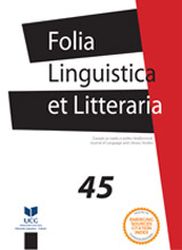ADIALOGUE BETWEEN THE NINETEENTH AND TWENTIETH CENTURY IN JOHN FOWLES’S THE FRENCH LIEUTENANT'S WOMAN
ADIALOGUE BETWEEN THE NINETEENTH AND TWENTIETH CENTURY IN JOHN FOWLES’S THE FRENCH LIEUTENANT'S WOMAN
Author(s): Nataša V. NinčetovićSubject(s): Studies of Literature, Theory of Literature
Published by: Filološki fakultet, Nikšić
Keywords: Fowles; neo-Victorian; postmodernism; past; present; history; convention; existentialism; freedom
Summary/Abstract: John Fowles’s The French Lieutenant's Woman (1969) is generally acknowledged as a postmodernist neo-Victorian novel. Presumably, it parodies Victorian conventions and represents a critical comment on the Victorian age. However, the aim of this research is to problematize the claim that the relationship between the Victorian and the postmodern age in this novel is much more complex. Fowles attempts to link these two apparently very different periods. The nineteenth century represents the source of English identity and an undeniable influence on the present. Nonetheless, the present also influences the past. The events which took place during the course of the twentieth century changed the way we conceptualize the past. Fowles implies that the past does not exist – what does exist is our deconstruction of the past. Still, Fowles reaches beyond this deconstruction. He believes that a novel should introduce something new and authentic. One of the key postmodernist concepts is that parody and irony represent the only possible originality. Still, apart from parodying the conventions of both the nineteenth and the twentieth century, The French Lieutenant’s Woman deals with existentialist dilemmas that might be applied to both periods.
Journal: Folia Linguistica et Litteraria
- Issue Year: 2023
- Issue No: 45
- Page Range: 231-246
- Page Count: 16
- Language: English

